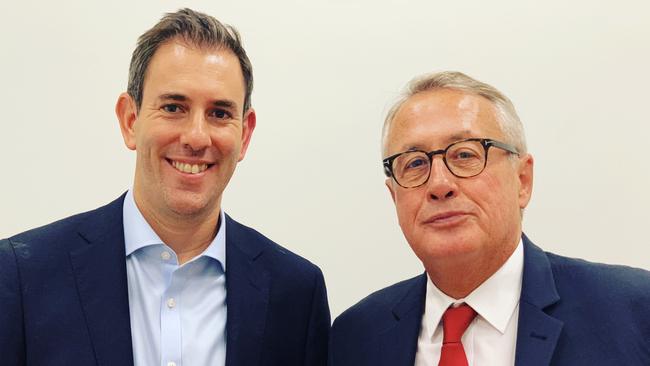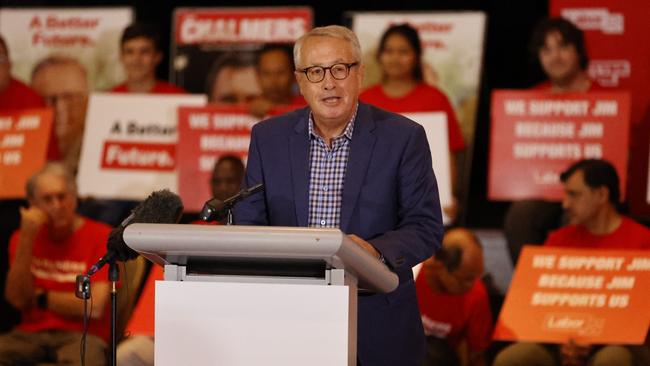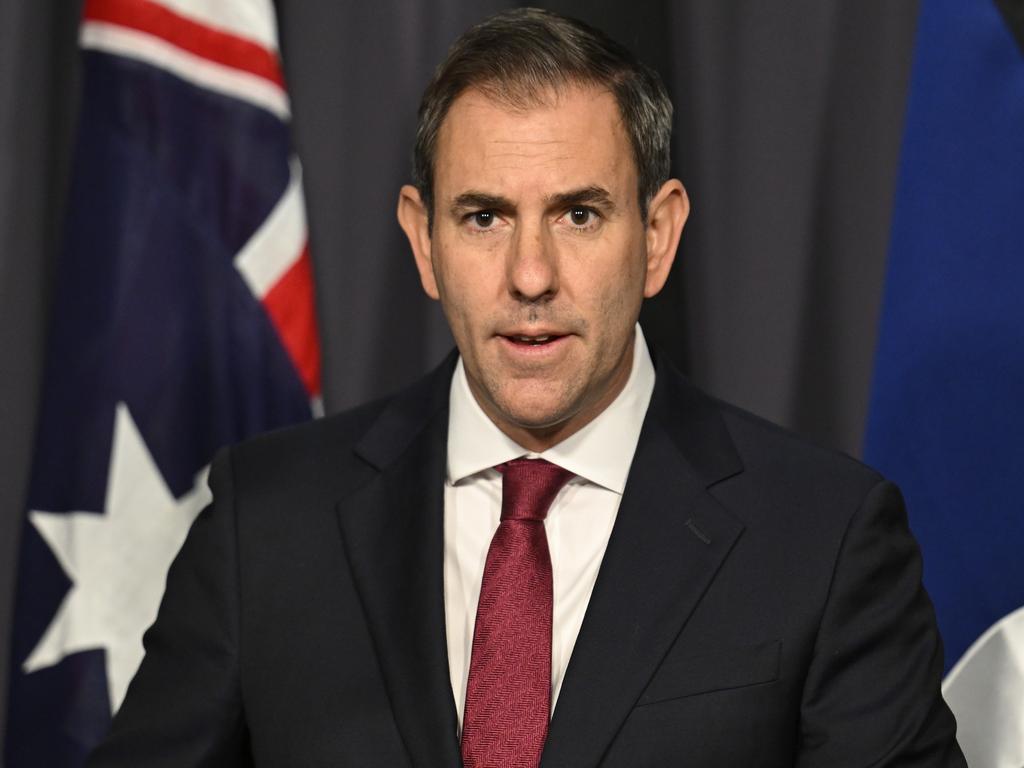
The irony is remarkable. When Jim Chalmers first became Treasurer, his mentor Wayne Swan likely would have told him two things: first, tread carefully on tax policy, which if mishandled can end political careers; and, second, be wary of new tax ideas dreamt up by your department.
Whether from arrogance or ignorance, or perhaps both, Chalmers has ignored Swan’s warnings.
Indeed, by ruling out any retreat on his proposed paper profits tax on superannuation earnings last week, he appears to be tempting fate. While there are obvious differences, the parallels between Chalmers’ current tax misadventure and Swan’s mining tax one are striking.
Three stand out. First, Chalmers, like Swan before him, has accepted a radical, untested and likely unworkable proposal from his department. Ken Henry’s proposed resource super-profits tax drew its inspiration from an obscure 1948 US academic paper, ignoring far more straightforward ways to collect this revenue.
While Treasury’s paper profits tax is not an entirely new departure – given that state land tax regimes also apply to unrealised gains – never before, at least to my knowledge, has anyone proposed that this methodology be imported into our income tax system.

Chalmers’ insistence that this is “modest and methodical change” is frankly embarrassing.
Second, Chalmers claims to be motivated by high principle but, in common with his mentor, he is actuated by petty resentments and jealousies. Swan saw the resource super-profits tax delivering a “king hit” to a mining community he harboured hostility against.
Similarly, Chalmers, for all his talk about values capitalism, seems to resent successful Australians, regardless of whether they are self-made, and so could not resist adding a nasty and unnecessary sting (taxing unrealised gains) to the tail of his proposed tax.
The third parallel is Chalmers’ superannuation tax, like the resource super-profits tax before it, will fail miserably to meet its revenue targets. Chalmers has focused on the fictitious headline figures in Treasury’s costing but ignored completely the warning that should have accompanied it: that capital taxation revenue estimates are by their nature highly unreliable given the ability of taxpayers to restructure their affairs and so should be treated with a grain of salt.
As we know, the resource super-profits tax was an unmitigated disaster. It eviscerated Swan’s (already shaky) reputation; it probably put an early end to Henry’s tenure as Treasury secretary; and it seriously weakened Kevin Rudd’s prime ministership.
But that is not the start of it. For a generation now and counting, it has thoroughly spooked our political and bureaucratic class, killing off any prospect of meaningful tax reform in this country. While Chalmers’ superannuation tax overreach, if legislated, is unlikely to leave the same trail of destruction, it has weakened the Treasurer’s standing with his economically literate colleagues and raised serious doubts about his political judgment.

For all his bravado, I suspect Chalmers knows this. That’s why he wants to shift the blame for the fiasco, saying last week that taxing paper profits was “recommended by Treasury”.
Treasury secretary Steven Kennedy, ever ready to be his Treasurer’s political wingman, claims the paper profits tax is “difficult tax reform”. It is nothing of the sort. It is an isolated, ill-considered and unprincipled revenue grab. I am reluctant to talk about tax reform, given how devoid of meaning this term is in the abstract – a motherhood label every charlatan attaches to their pet ideas – but at the very least it requires thinking about tax on a system-wide basis.
If we cut to the chase, there are two tax reform philosophies in this country: the pro-growth school and the redistributionist one.
The former views tax as an economic deadweight; accordingly, it believes in cutting income tax burdens, recognising that the biggest gains come from lowering both the top personal rate and the corporate rate.
It insists this be funded primarily by lower government spending, with increases in less inefficient taxes (or tax base broadening) playing a strictly secondary role.
It models a particular definition of fairness, valuing equality of opportunity, social mobility and rising community living standards over equality of outcomes.
The redistributionist school views tax only as a source of revenue for Canberra. It argues community tax burdens must be raised overall, in step with growing demand for public services.
While it is open to income tax relief, particularly for low to middle-income wage earners, it requires that it be funded by higher taxes elsewhere – perhaps on consumption, investment or carbon dioxide emissions – not cuts to spending. For this school, equality of outcome is the ultimate test of fairness, requiring heavy tax burdens on higher-income earners and welfare dependence, even if this results in slower growth, flatlining average incomes and less social mobility.

Our reform generation was a passionate believer in pro-growth tax reform. The successful “big bang” packages it introduced in 1985 and 2000 were straight out of this playbook. The pro-growth reformers understood this philosophy’s powerful political appeal, realising it tapped into working Australians’ desire for a fair go – to keep more of the rewards for their hard work, creativity and risk-taking – freeing them from welfare dependency.
To get their changes through, the reformers were prepared to take on their redistributionist critics, challenging their envy-ridden, zero-sum idea of fairness – pointing out that it led to a shrinking pie and undermined social cohesion.
Tax reform in Australia has been a dead letter for a generation for numerous reasons but one stands out for me. To borrow from Paul Keating, all the pet shop galahs in Canberra – the leaders of both major political parties, our Treasury secretaries past and present (with John Fraser and Henry as honourable exceptions) and most economic commentators – have been big-government redistributionists.
Chalmers lacks the courage and intelligence to break out of this intellectual straitjacket. The Labor Left, which dominates the party, is utterly captive to it. Since John Howard left the political scene, so too has been the Liberal Party, leaving Australia’s millions of taxpayers with no political representation. Sussan Ley should reject every element of Labor’s paper profits tax. And she should commit her party to the pro-growth tax philosophy it has lost sight of in recent decades.
David Pearl is a former Treasury assistant secretary.






